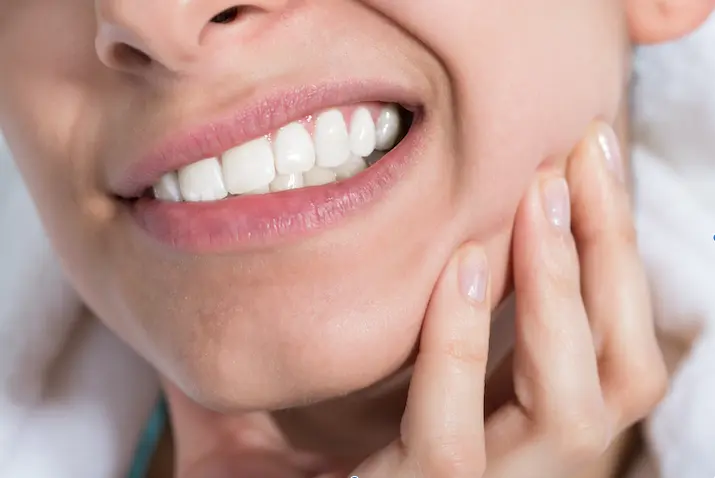
15 May How Stress Affects Your Teeth (And What You Can Do about It!)
Over 75% of U.S. adults state that their health is affected by feelings of stress, according to the American Psychological Association. In fact, stress can also take a toll on your oral health, too.
The effects of stress on teeth can be subtle at first, but over time, they can lead to major dental problems.
Can you lose teeth from stress? Read on to learn more about it.
Can You Lose Teeth From Stress?
When you’re under stress, your body can react in ways that directly affect your mouth. Responses like these are often unconscious or overlooked until symptoms become too uncomfortable to ignore.
One of the most common stress-related habits is bruxism, or teeth grinding. Many people grind their teeth while sleeping, but some also do it during the day without realizing it.
Over time, this repetitive grinding can wear down the enamel, making teeth more sensitive and vulnerable to decay. In some cases, grinding may even lead to cracked or fractured teeth, which can require extensive restorative treatment.
Closely related to grinding is jaw clenching, another physical reaction to stress. When your jaw remains tightly clenched for extended periods, it puts added strain on your joints.
Such strain can result in jaw pain, headaches, and limited movement of the mouth. TMJ disorders can become chronic and significantly impact your quality of life if left untreated.
More Ways Stress Can Affect Your Oral Health
Neglecting oral hygiene is another way stress can affect your teeth. During periods of emotional or physical exhaustion, brushing and flossing may fall by the wayside. You may forget to brush before bed, rush through your routine, or cancel dental appointments.
When oral hygiene is inconsistent, plaque builds up more easily, leading to cavities, gum inflammation, and bad breath. Skipping even a few days of proper care can start to cause problems.
Stress can also alter saliva levels. Many people experience dry mouth when they are anxious or are taking medications for anxiety and depression. Keep in mind that a lack of saliva can raise your risk for both tooth decay and gum irritation.
In addition, chronic stress can weaken your immune system, making it that much harder for your body to put a stop to infections, including those affecting your gums. It can cause minor gum issues to escalate quickly into gingivitis or periodontitis.
You might notice symptoms like red, swollen, or bleeding gums, all of which require professional care. In later stages, gum disease can even lead to tooth loss. So yes, you can lose teeth from stress, particularly if it aggravates other oral health concerns.
Tried and True Steps to Protect Your Smile During Stress
Managing your day-to-day stress plays a major role in keeping your smile healthy. Fortunately, there are several things you can do to minimize the impact of stress on your oral health.
When it comes to dental care for stressed individuals, pay close attention to your oral hygiene routine. Even during busy or difficult times, always take the time to brush your teeth twice a day.
Keeping a consistent routine makes all the difference for oral health. If you find yourself too tired at night, consider setting a reminder or brushing earlier in the evening to avoid skipping it altogether.
Do you suffer from nightly teeth grinding? If so, talk to your dentist about using a custom-fitting night guard. A well-fitted guard protects your enamel and reduces strain on your jaw muscles. The team at McIlwain Dental Specialists offers custom appliances designed for comfort and durability, tailored specifically to your bite.
If you take medications that contribute to dry mouth, your dentist can recommend solutions. Examples include saliva substitutes or specific rinses to help ease the discomfort.
More Steps to Consider
Managing stress itself is also key to protecting your dental health. Consider building healthy habits into your daily routine, such as:
- Taking short breaks to stretch, walk, or breathe during your workday
- Indulging in mindfulness or meditation to help soothe your mind
- Exercising to boost mood and lower tension
- When stress levels are under control, many oral health issues tend to improve as well.
Make sure to attend regular dental visits as a way of preventing stress-related dental issues. Your dentist can find early signs of stress damage. This includes worn enamel, gum inflammation, or jaw tension. They can help you fix these issues before they get worse.
Preventive care is a wise way to stay clear of the impact of stress on oral hygiene. At McIlwain Dental Specialists, we provide caring, family-centered care. Our friendly environment helps even the most nervous patients feel comfortable.
Why McIlwain Dental Specialists Is Your Best Ally Against Stress-Related Dental Issues
At McIlwain Dental Specialists, we understand that stress is a part of life, but it should never be a threat to your smile. Our experienced team is here to help you navigate the challenges of stress and oral health with the guidance and care you deserve.
We offer a wide range of dental services. This includes custom night guards, TMJ evaluations, cleanings, and personalized treatment plans. All our services are designed with your comfort in mind.
Whether you are a busy professional or someone with anxiety, we will help you create a plan that fits your needs.
We believe that great dental care should go hand in hand with overall well-being. That is why we use a whole-person approach to dentistry. We know that oral health is linked to your physical and emotional well-being. When you choose McIlwain Dental Specialists, you’re choosing certified dentists who passionately value every aspect of your health. Don’t wait to schedule an oral consultation with McIlwain Dental Specialists today.


